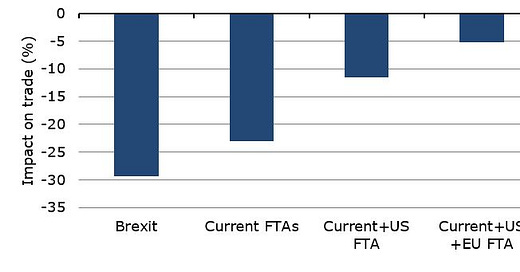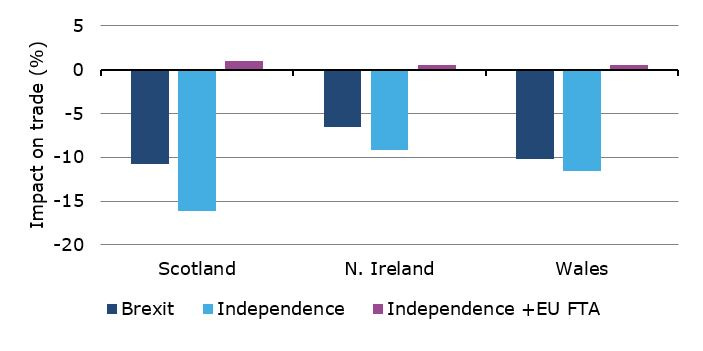I hate to revisit Brexit and the arguments by the Brexit supporters that the newfound sovereignty of the country will allow it to sign trade deals with everyone and create much more growth than before. But in the light of a rising likelihood of another Scottish independence referendum, it is worth revisiting these arguments.
First of all, there were only two or so economists who pretended that their models showed that the UK would have more growth and more trade after Brexit than before. And these models all had one thing in common: they were not gravity models of trade.
Gravity models of trade incorporate the fact that it is easier to trade with close neighbours than with distant ones. Differences in time zones and higher transportation costs as well as increasing cultural differences and make trade with countries that are farther away more difficult, even in our modern world. In short, a free trade agreement with 300 million Americans doesn’t lead to the same trade as a free trade agreement with 300 million Europeans. That is one of the key empirical observations of trade patterns throughout history and across the globe. You can build a model that doesn’t include these effects and wish them away, but in reality that doesn’t work.
So, if we use a state-of-the-art gravity model of international trade like Steven Brakman and his colleagues have done and try to estimate the impact of Brexit and different free trade agreements on UK trade, it is no surprise that a free trade agreement (FTA) with the United States is by far not enough to compensate for the loss of access to the common market. Even if the UK would enter an FTA with the EU and the US, it would still experience a small net loss in trade because of the trade barriers that remain in place within each FTA (e.g. pharmaceuticals and other controlled products, or agriculture). No matter what the UK does, it will always be worse off in terms of global trade than if it had stayed within the EU.
Trade impact of Brexit and UK free trade agreements
Source: Brakman et al. (2021)
But those are bygones.
Now let’s look at what would happen to Scotland, Wales, and Northern Ireland should they decide to become independent. Because an independent Scotland would lose the advantages of existing FTAs the UK already has and because it would have to build its own trade infrastructure, it would be much worse off than if it stayed within the UK. That is the key reason why I am personally against Scottish independence just like I was against Brexit.
But here is the kicker. What if Scotland (or any of the other nations in the UK) becomes independent and then immediately enters the European Union? It turns out that re-joining the EU would reverse all the loss of trade from Brexit and more. An independent Scotland that is a member of the EU would roughly be in the same position as it was before Brexit, even if that meant no FTA with the US or other countries. And if I were Scottish and that option (leaving the UK and re-joining the EU) would be on the ballot box, I would be all for it, because it is better for the Scottish economy, its people and creates more wealth and more jobs than staying in a “Global Britain”.
Re-joining the EU can eliminate the cost of Brexit and independence from the UK
Source: Brakman et al. (2021)






If the SIN (Scotland, Iceland, NZ) alliance are serious about prioritizing well being than pure economic gain, they will trade with nearer partners to limit carbon emissions. At some point, when carbon credits are more fairly valued, bartering across the Atlantic is going to be more expensive anyway